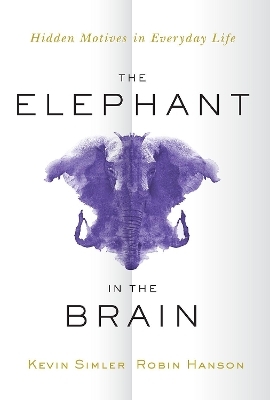
The Elephant in the Brain
Oxford University Press Inc (Verlag)
978-0-19-755195-0 (ISBN)
Human beings are primates, and primates are political animals. Our brains, therefore, are designed not just to hunt and gather, but also to help us get ahead socially, often via deception and self-deception. But while we may be self-interested schemers, we benefit by pretending otherwise. The less we know about our own ugly motives, the better - and thus we don't like to talk or even think about the extent of our selfishness. This is "the elephant in the brain." Such an introspective taboo makes it hard for us to think clearly about our nature and the explanations for our behavior. The aim of this book, then, is to confront our hidden motives directly - to track down the darker, unexamined corners of our psyches and blast them with floodlights. Then, once everything is clearly visible, we can work to better understand ourselves: Why do we laugh? Why are artists sexy? Why do we brag about travel? Why do we prefer to speak rather than listen?
Our unconscious motives drive more than just our private behavior; they also infect our venerated social institutions such as Art, School, Charity, Medicine, Politics, and Religion. In fact, these institutions are in many ways designed to accommodate our hidden motives, to serve covert agendas alongside their "official" ones. The existence of big hidden motives can upend the usual political debates, leading one to question the legitimacy of these social institutions, and of standard policies designed to favor or discourage them. You won't see yourself - or the world - the same after confronting the elephant in the brain.
Kevin Simler is a writer and software engineer currently living in Brooklyn, NY. He's worked for ten years as a programmer, product designer, and engineering director, and continues to advise startups about technology, leadership, and recruiting. Robin Hanson is an associate professor of economics at George Mason University and a research associate at the Future of Humanity Institute of Oxford University. He has a doctorate in social science, master's degrees in physics and philosophy, and nine years of experience as a research programmer in artificial intelligence and Bayesian statistics. With over 3100 citations and sixty academic publications, he's recognized not only for his contributions to economics (especially, pioneering the theory and use of prediction markets), but also for the wide range of fields in which he's been published. He is the author of The Age of Em: Work, Love, and Life when Robots Rule the Earth (OUP 2016).
Introduction
01 Animal Behavior
02 Competition
03 Norms
04 Cheating
05 Self-Deception
06 Counterfeit Reasons
07 Body Language
08 Laughter
09 Conversation
10 Consumption
11 Art
12 Charity
13 Education
14 Medicine
15 Religion
16 Politics
Conclusion
| Erscheinungsdatum | 26.10.2020 |
|---|---|
| Zusatzinfo | 9 |
| Verlagsort | New York |
| Sprache | englisch |
| Maße | 155 x 231 mm |
| Gewicht | 567 g |
| Themenwelt | Sachbuch/Ratgeber ► Gesundheit / Leben / Psychologie ► Psychologie |
| Sachbuch/Ratgeber ► Natur / Technik | |
| Geisteswissenschaften ► Psychologie ► Allgemeine Psychologie | |
| Geisteswissenschaften ► Psychologie ► Verhaltenstherapie | |
| ISBN-10 | 0-19-755195-5 / 0197551955 |
| ISBN-13 | 978-0-19-755195-0 / 9780197551950 |
| Zustand | Neuware |
| Informationen gemäß Produktsicherheitsverordnung (GPSR) | |
| Haben Sie eine Frage zum Produkt? |
aus dem Bereich


